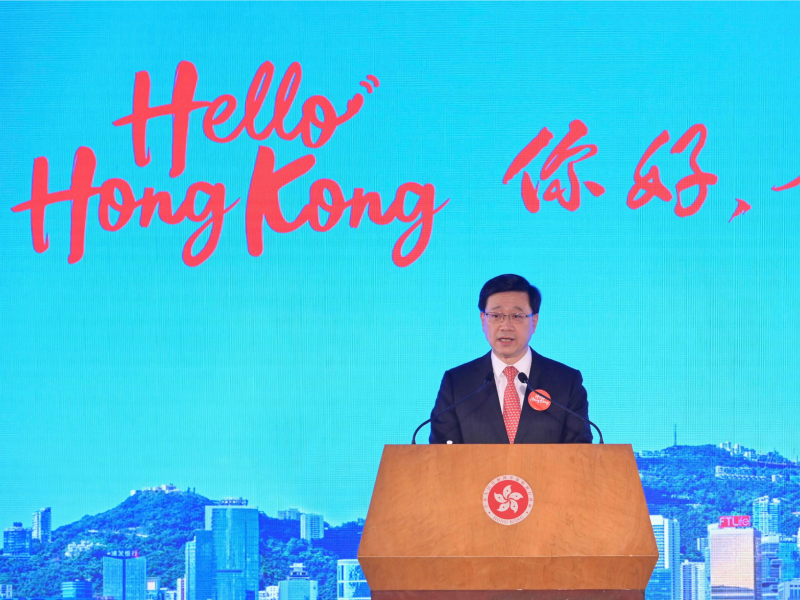Arun Sudhaman 09 Feb 2023 // 12:48AM GMT

HONG KONG — The 'Hello Hong Kong' tourism campaign, which aims to attract visitors back to the city, has drawn mixed reviews from public relations experts, who fear that the city lacks a clear strategic vision to restore its global reputation.
Announced last week, 'Hello Hong Kong' includes 500,000 free air tickets and has rolled out via series of promotional videos and ads that feature the city's chief executive John Lee, along with business leaders and local Cantopop stars.
The campaign comes as Hong Kong attempts to reopen after three years of some of the world's most stringent Covid restrictions, along with widespread political unrest that ushered in a new security law in 2020.
It also follows the earlier 'Relaunch Hong Kong' initiative, which saw PR firm Consulum hired to help rebuild the city's prized reputation as a global business hub. While that campaign has resulted in little external activity despite its $5.7m price tag, Hong Kong Tourism Board executive director Dane Cheng confirmed that research from the earlier effort was taken into account when developing the 'Hello Hong Kong' push.
Brett Free, who previously oversaw 'Relaunch Hong Kong' as deputy director of the Hong Kong government's Information Services Department (ISD), told PRovoke Media that 'Hello Hong Kong' was a positive step for the city in terms of its efforts to reopen.
But Free was less impressed by the campaign's messaging and promotional details. "The initial campaign videos seem more targeted at Chinese audiences, whether here, the Mainland or overseas, so I hope we see some specific content that would resonate better with audiences in Southeast Asia, Japan, Korea and Western markets such as Australia, US, Canada, Europe etc.," he said.
"The fact that specific details of the giveaways won’t be known for weeks after the launch of the campaign is puzzling and an opportunity lost because doing it this way fails to build on the buzz of the announcement and create some momentum — all the more puzzling when it seems from the Airport Authority’s own explanatory notes that about 175,000 tickets will be set aside to support tourism and promote HK," he added.
Ruder Finn Asia EVP of global reputation management Charles Lankester likened the ticket giveaway to a "superficial, promotional sugar rush," but commended the "simplicity and boldness of the idea."
"Hong Kong has been battered in the past four years and has largely dropped off the global tourism radar," he said. "So the idea to give away half a million tickets made sense and, because the idea was simple, it drove global headlines."
However, from a long-term perspective, Lankester argues that "'Hello Hong Kong' is not a recommended treatment regime."
"It’s frothy, vapid and meaningless," said Lankester, noting "the less said the better" about the campaign ads.
It is understood that planning for this campaign has been underway for one to two years, drawing bemusement from other PR specialists in the city. "What exactly has the HKTB been doing for the past four years?" asked one senior PR agency figure. "They must have realised that it was only a matter of time before Hong Kong reconnected with the world."
"What’s lacking is emotional connection to the 'real' HK — the alleys of Central, the eclectic atmosphere of older districts, the beauty of HK’s natural environment, the unknown attractions such as mountain bike trails and running trails, and beaches, and creative use of the two new drawcards of M+ and Palace Museum," added another government communications veteran. "Maybe the videos to come will feature these elements but so far, the emotional connection is missing."
Ogilvy PR Hong Kong president Clara Shek noted that Hong Kong's efforts to entice visitors back required "a lot of strategic deliberation." She also pointed out that few international media had carried the news, and those that did "reminded readers of the socio-political and economic woes of Hong Kong in the past few years."
Shek added that while global social listening sentiment was "neutral", "netizens in China seemed to be divided, shaped by their past experiences."
The campaign launched a few days before Hong Kong's largest national security trial, in which 47 pro-democracy figures are being prosecuted. The heavy involvement of government officials in the campaign rollout has not gone unnoticed, including a widely criticised visual of an all-male executive lineup.
Shek believes the campaign requires a clearer strategy in light of the challenges the city has faced in recent years. "Hong Kong’s perception has changed or eroded a great deal over the past few years," she said. "What are the new compelling reasons for visiting this city? Who are the visitors that we would like to attract, what do they care about and what motivates them? Hong Kong as a destination needs to answer these fundamental questions and communicate its new positioning in a creative, modern and authentic manner that connects with the hearts and minds of the targeted visitors."
Even so, Lankester believes the Hong Kong Tourism Board still has "a golden opportunity to plan how they will sustainably build Brand Hong Kong over the next decade."
"By all means run the current campaign for a while and (please) track sentiment and find out what people in Hong Kong and globally actually think about the work," he said. "But quickly look outwards and see what other iconic destinations are doing marketing-wise. South Korea, Australia and Japan would be good places to start. Hong Kong also deserves the brightest marketing talent working for it – go out and find it, hire it and put it to work. My hope? In 2024 everyone is in awe of Hong Kong’s global marketing campaign. Not sniggering about it."



































.jpg)

















